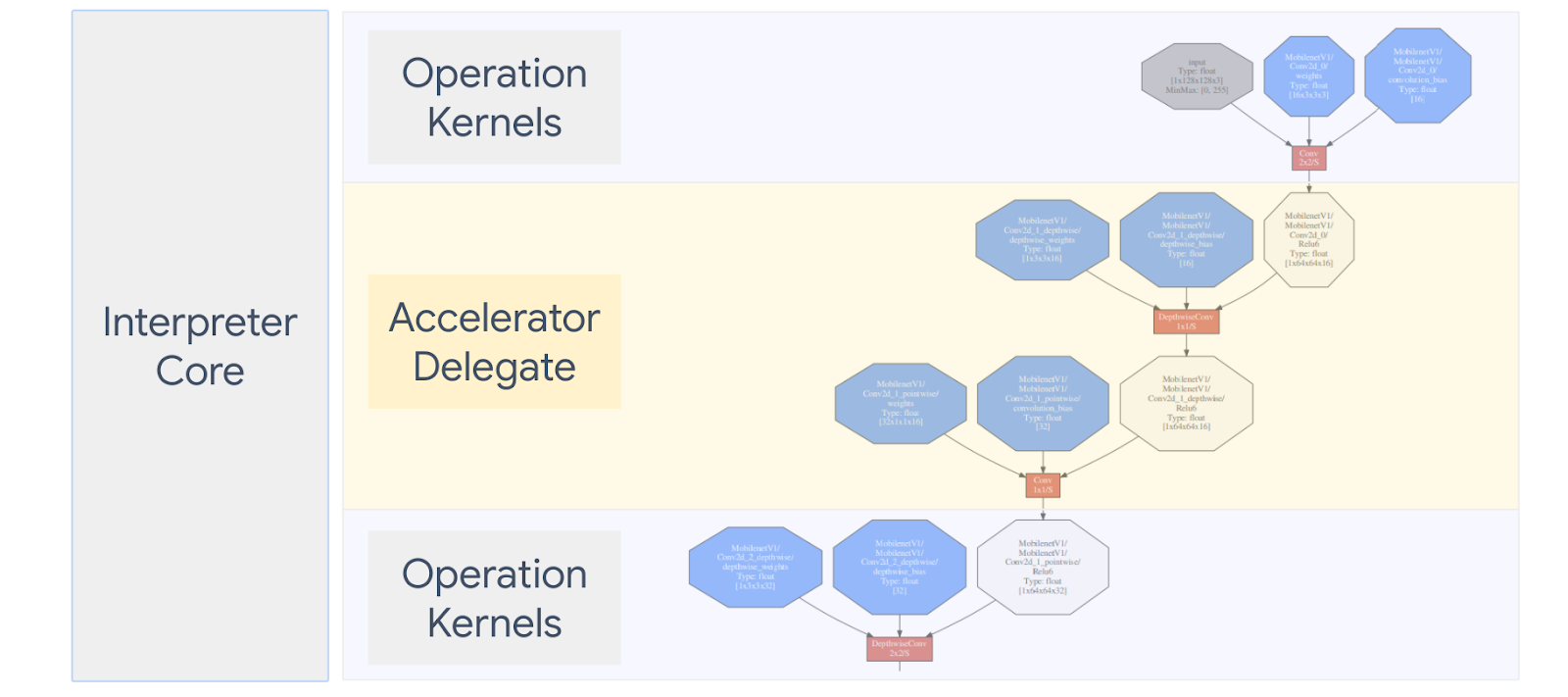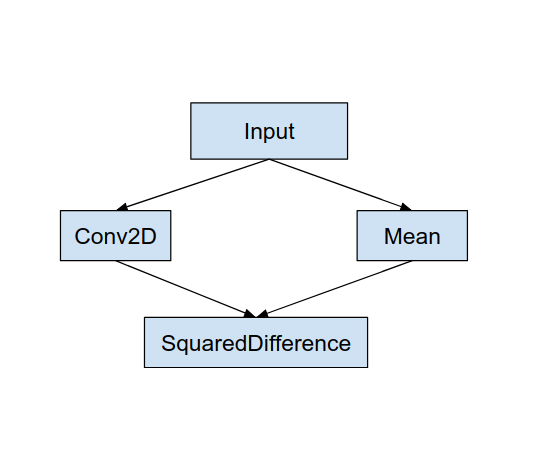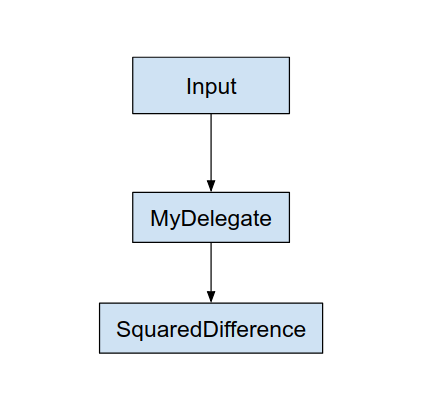A LiteRT 「委派」可讓您: 在其他執行程式上執行模型 (部分或整個)。這個機制可將 各種裝置端加速器,例如 GPU 或 Edge TPU (Tensor Processing Unit)。這可讓開發人員享有靈活彈性 從預設 TFLite 分離方法,以加快推論速度。
下方圖表概述委派代表,詳情請參閱以下各節。

何時該建立自訂委派代表?
LiteRT 有各種適用於目標加速器的委派項目,例如 GPU、DSP 和 EdgeTPU
下列情況適合自行建立委派代表:
- 您想要整合所有不支援新的機器學習推論引擎 現有的委派代表。
- 您有一個自訂硬體加速器能改善目前已知的硬體執行階段 情境
- 您正在開發可調整的 CPU 最佳化項目 (例如運算子融合) 加快某些模型的速度
委派代表的運作方式為何?
建議您使用一個簡單的模型圖,如下方所示,以及委派的「MyDelegate」 較快實作 Conv2D 和平均值作業

套用這個「MyDelegate」後,原始 LiteRT 圖形就會 更新後的程式碼如下所示:

上方圖表是 LiteRT 分割原始圖形的管道所取得 下列兩項規則:
- 委派項目可處理的特定作業會放入 同時滿足原始運算工作流程 不同作業之間的依附元件
- 每個待委派分區僅有未啟用的輸入和輸出節點 管理。
每個委派項目處理的分區都會由委派節點取代 (可以 做為委派核心),並且評估 套用這些分區的資料
視模型而定,最終圖表最終可能會包含一或多個節點, 後者代表委派作業不支援某些作業。一般來說 不必由委派代表處理多個分區 從委派代表切換至主要圖表時, 將委派子圖表的結果傳遞至結果的主要圖表 或因記憶體副本而產生資料 (例如從 GPU 到 CPU)這類負擔可能會抵銷 尤其在記憶體大量複製時,效能會有所提升。
導入您自己的自訂委派
我們建議透過以下方式新增委派代表: SimpleDelegate API:
如要建立新的委派代表,您必須實作 2 個介面,並提供 介面方法的實作。
1 至 SimpleDelegateInterface
這個類別代表委派作業的功能, 以及用於建立核心類別,以便封裝 委派圖表。詳情請參閱 C++ 標頭檔案。 程式碼中的註解會詳細說明各個 API。
2 - SimpleDelegateKernelInterface
這個類別會封裝用於初始化 / 準備 / 及執行 或委派給管理員。
它具備:(請參閱 定義)
- Init(...):系統會呼叫一次,執行任何一次性初始化作業。
- Prepare(...):針對這個節點的每個執行個體呼叫 - 這項操作 若您有多個委派分區通常希望你有一天 所以會在每次調整張量大小時呼叫這個方法。
- Invoke(...):系統會呼叫此方法進行推論。
範例
在這個範例中,您將建立非常簡單的委派代表,只能支援 2 個 僅支援使用 float32 張量的運算類型 (ADD) 和 (SUB)。
// MyDelegate implements the interface of SimpleDelegateInterface.
// This holds the Delegate capabilities.
class MyDelegate : public SimpleDelegateInterface {
public:
bool IsNodeSupportedByDelegate(const TfLiteRegistration* registration,
const TfLiteNode* node,
TfLiteContext* context) const override {
// Only supports Add and Sub ops.
if (kTfLiteBuiltinAdd != registration->builtin_code &&
kTfLiteBuiltinSub != registration->builtin_code)
return false;
// This delegate only supports float32 types.
for (int i = 0; i < node->inputs->size; ++i) {
auto& tensor = context->tensors[node->inputs->data[i]];
if (tensor.type != kTfLiteFloat32) return false;
}
return true;
}
TfLiteStatus Initialize(TfLiteContext* context) override { return kTfLiteOk; }
const char* Name() const override {
static constexpr char kName[] = "MyDelegate";
return kName;
}
std::unique_ptr<SimpleDelegateKernelInterface> CreateDelegateKernelInterface()
override {
return std::make_unique<MyDelegateKernel>();
}
};
接著,從
SimpleDelegateKernelInterface
// My delegate kernel.
class MyDelegateKernel : public SimpleDelegateKernelInterface {
public:
TfLiteStatus Init(TfLiteContext* context,
const TfLiteDelegateParams* params) override {
// Save index to all nodes which are part of this delegate.
inputs_.resize(params->nodes_to_replace->size);
outputs_.resize(params->nodes_to_replace->size);
builtin_code_.resize(params->nodes_to_replace->size);
for (int i = 0; i < params->nodes_to_replace->size; ++i) {
const int node_index = params->nodes_to_replace->data[i];
// Get this node information.
TfLiteNode* delegated_node = nullptr;
TfLiteRegistration* delegated_node_registration = nullptr;
TF_LITE_ENSURE_EQ(
context,
context->GetNodeAndRegistration(context, node_index, &delegated_node,
&delegated_node_registration),
kTfLiteOk);
inputs_[i].push_back(delegated_node->inputs->data[0]);
inputs_[i].push_back(delegated_node->inputs->data[1]);
outputs_[i].push_back(delegated_node->outputs->data[0]);
builtin_code_[i] = delegated_node_registration->builtin_code;
}
return kTfLiteOk;
}
TfLiteStatus Prepare(TfLiteContext* context, TfLiteNode* node) override {
return kTfLiteOk;
}
TfLiteStatus Eval(TfLiteContext* context, TfLiteNode* node) override {
// Evaluate the delegated graph.
// Here we loop over all the delegated nodes.
// We know that all the nodes are either ADD or SUB operations and the
// number of nodes equals ''inputs_.size()'' and inputs[i] is a list of
// tensor indices for inputs to node ''i'', while outputs_[i] is the list of
// outputs for node
// ''i''. Note, that it is intentional we have simple implementation as this
// is for demonstration.
for (int i = 0; i < inputs_.size(); ++i) {
// Get the node input tensors.
// Add/Sub operation accepts 2 inputs.
auto& input_tensor_1 = context->tensors[inputs_[i][0]];
auto& input_tensor_2 = context->tensors[inputs_[i][1]];
auto& output_tensor = context->tensors[outputs_[i][0]];
TF_LITE_ENSURE_EQ(
context,
ComputeResult(context, builtin_code_[i], &input_tensor_1,
&input_tensor_2, &output_tensor),
kTfLiteOk);
}
return kTfLiteOk;
}
private:
// Computes the result of addition of 'input_tensor_1' and 'input_tensor_2'
// and store the result in 'output_tensor'.
TfLiteStatus ComputeResult(TfLiteContext* context, int builtin_code,
const TfLiteTensor* input_tensor_1,
const TfLiteTensor* input_tensor_2,
TfLiteTensor* output_tensor) {
if (NumElements(input_tensor_1) != NumElements(input_tensor_2) ||
NumElements(input_tensor_1) != NumElements(output_tensor)) {
return kTfLiteDelegateError;
}
// This code assumes no activation, and no broadcasting needed (both inputs
// have the same size).
auto* input_1 = GetTensorData<float>(input_tensor_1);
auto* input_2 = GetTensorData<float>(input_tensor_2);
auto* output = GetTensorData<float>(output_tensor);
for (int i = 0; i < NumElements(input_tensor_1); ++i) {
if (builtin_code == kTfLiteBuiltinAdd)
output[i] = input_1[i] + input_2[i];
else
output[i] = input_1[i] - input_2[i];
}
return kTfLiteOk;
}
// Holds the indices of the input/output tensors.
// inputs_[i] is list of all input tensors to node at index 'i'.
// outputs_[i] is list of all output tensors to node at index 'i'.
std::vector<std::vector<int>> inputs_, outputs_;
// Holds the builtin code of the ops.
// builtin_code_[i] is the type of node at index 'i'
std::vector<int> builtin_code_;
};
對新委派代表進行基準測試及評估
TFLite 有一套工具可讓您快速測試 TFLite 模型。
- 模型基準工具: 這項工具會採用 TFLite 模型,隨機產生輸入內容,然後重複 會以指定次數執行模型輸出的延遲時間 結尾的統計資料
- 推論差異工具: 這項工具針對特定模型產生隨機高斯資料,並傳送 介紹兩種 TFLite 解譯器,一種搭載單一執行緒 CPU 另一個則是透過使用者定義的規格這種模型會測量 輸出張量之間的差異 每項服務都以資產為依據這項工具也有助於對準確性偵錯 以負載平衡機制分配流量 即可降低應用程式發生效能問題的風險
- 圖片分類和圖片分類模型 物件偵測這些工具可以在 這裡
此外,TFLite 還有大量的核心和運算單元測試, 以便測試新的委派作業,並確保一般 TFLite 執行路徑並未損毀。
如要重新使用 TFLite 測試和新委派工具,您可以使用 使用下列任一選項:
選擇最佳方法
這兩種方法都需要進行幾項變更,詳情如下。不過,第一個 方法,以靜態方式連結委派項目,且必須重新建構測試。 基準化和評估工具相對地,第二步 做為共用程式庫,並要求您公開建立/刪除 方法。
因此,外部委派機制會與 TFLite 的 預先建構的 LiteRT 工具二進位檔。 但這較不明確,而且在自動化程序中設定可能較為複雜 整合測試請使用委派註冊商的方法提供更清楚說明。
選項 1:善用委派註冊商
委派註冊商 保存委派供應商清單,每個供應商都能輕鬆建立 根據指令列旗標的 TFLite 委派代表,因此很方便 工具將新的委派代表插入上述所有 LiteRT 工具 請先建立新的委派供應商 然後只修改 BUILD 規則即可。完整的範例 整合程序如下所示 (如需程式碼 這裡)。
假設您擁有實作 SimpleDelegate API 的委派,以及 外部「C」建立/刪除這個「虛擬」的 API委派代表,如下所示:
// Returns default options for DummyDelegate.
DummyDelegateOptions TfLiteDummyDelegateOptionsDefault();
// Creates a new delegate instance that need to be destroyed with
// `TfLiteDummyDelegateDelete` when delegate is no longer used by TFLite.
// When `options` is set to `nullptr`, the above default values are used:
TfLiteDelegate* TfLiteDummyDelegateCreate(const DummyDelegateOptions* options);
// Destroys a delegate created with `TfLiteDummyDelegateCreate` call.
void TfLiteDummyDelegateDelete(TfLiteDelegate* delegate);
如要整合「DummyDelegate」與基準工具和推論工具,請 委派供應商,如下所示:
class DummyDelegateProvider : public DelegateProvider {
public:
DummyDelegateProvider() {
default_params_.AddParam("use_dummy_delegate",
ToolParam::Create<bool>(false));
}
std::vector<Flag> CreateFlags(ToolParams* params) const final;
void LogParams(const ToolParams& params) const final;
TfLiteDelegatePtr CreateTfLiteDelegate(const ToolParams& params) const final;
std::string GetName() const final { return "DummyDelegate"; }
};
REGISTER_DELEGATE_PROVIDER(DummyDelegateProvider);
std::vector<Flag> DummyDelegateProvider::CreateFlags(ToolParams* params) const {
std::vector<Flag> flags = {CreateFlag<bool>("use_dummy_delegate", params,
"use the dummy delegate.")};
return flags;
}
void DummyDelegateProvider::LogParams(const ToolParams& params) const {
TFLITE_LOG(INFO) << "Use dummy test delegate : ["
<< params.Get<bool>("use_dummy_delegate") << "]";
}
TfLiteDelegatePtr DummyDelegateProvider::CreateTfLiteDelegate(
const ToolParams& params) const {
if (params.Get<bool>("use_dummy_delegate")) {
auto default_options = TfLiteDummyDelegateOptionsDefault();
return TfLiteDummyDelegateCreateUnique(&default_options);
}
return TfLiteDelegatePtr(nullptr, [](TfLiteDelegate*) {});
}
BUILD 規則定義很重要,因為您必須確保 永遠連結程式庫,且不會由最佳化工具捨棄。
#### The following are for using the dummy test delegate in TFLite tooling ####
cc_library(
name = "dummy_delegate_provider",
srcs = ["dummy_delegate_provider.cc"],
copts = tflite_copts(),
deps = [
":dummy_delegate",
"//tensorflow/lite/tools/delegates:delegate_provider_hdr",
],
alwayslink = 1, # This is required so the optimizer doesn't optimize the library away.
)
在 BUILD 檔案中新增這兩個包裝函式規則,以建立 基準測試工具、推論工具和其他可能執行的評估工具 並自行與委派代表聯絡
cc_binary(
name = "benchmark_model_plus_dummy_delegate",
copts = tflite_copts(),
linkopts = task_linkopts(),
deps = [
":dummy_delegate_provider",
"//tensorflow/lite/tools/benchmark:benchmark_model_main",
],
)
cc_binary(
name = "inference_diff_plus_dummy_delegate",
copts = tflite_copts(),
linkopts = task_linkopts(),
deps = [
":dummy_delegate_provider",
"//tensorflow/lite/tools/evaluation/tasks:task_executor_main",
"//tensorflow/lite/tools/evaluation/tasks/inference_diff:run_eval_lib",
],
)
cc_binary(
name = "imagenet_classification_eval_plus_dummy_delegate",
copts = tflite_copts(),
linkopts = task_linkopts(),
deps = [
":dummy_delegate_provider",
"//tensorflow/lite/tools/evaluation/tasks:task_executor_main",
"//tensorflow/lite/tools/evaluation/tasks/imagenet_image_classification:run_eval_lib",
],
)
cc_binary(
name = "coco_object_detection_eval_plus_dummy_delegate",
copts = tflite_copts(),
linkopts = task_linkopts(),
deps = [
":dummy_delegate_provider",
"//tensorflow/lite/tools/evaluation/tasks:task_executor_main",
"//tensorflow/lite/tools/evaluation/tasks/coco_object_detection:run_eval_lib",
],
)
您也可以將這個委派供應商插入 TFLite 核心測試,如所述 請按這裡。
選項 2:使用外部委派代表
在這個替代方案中,您要先建立外部委派轉接器 external_delegate_adaptor.cc 如下所示。請注意,相較於 方法 1 如先前所述。
TfLiteDelegate* CreateDummyDelegateFromOptions(char** options_keys,
char** options_values,
size_t num_options) {
DummyDelegateOptions options = TfLiteDummyDelegateOptionsDefault();
// Parse key-values options to DummyDelegateOptions.
// You can achieve this by mimicking them as command-line flags.
std::unique_ptr<const char*> argv =
std::unique_ptr<const char*>(new const char*[num_options + 1]);
constexpr char kDummyDelegateParsing[] = "dummy_delegate_parsing";
argv.get()[0] = kDummyDelegateParsing;
std::vector<std::string> option_args;
option_args.reserve(num_options);
for (int i = 0; i < num_options; ++i) {
option_args.emplace_back("--");
option_args.rbegin()->append(options_keys[i]);
option_args.rbegin()->push_back('=');
option_args.rbegin()->append(options_values[i]);
argv.get()[i + 1] = option_args.rbegin()->c_str();
}
// Define command-line flags.
// ...
std::vector<tflite::Flag> flag_list = {
tflite::Flag::CreateFlag(...),
...,
tflite::Flag::CreateFlag(...),
};
int argc = num_options + 1;
if (!tflite::Flags::Parse(&argc, argv.get(), flag_list)) {
return nullptr;
}
return TfLiteDummyDelegateCreate(&options);
}
#ifdef __cplusplus
extern "C" {
#endif // __cplusplus
// Defines two symbols that need to be exported to use the TFLite external
// delegate. See tensorflow/lite/delegates/external for details.
TFL_CAPI_EXPORT TfLiteDelegate* tflite_plugin_create_delegate(
char** options_keys, char** options_values, size_t num_options,
void (*report_error)(const char*)) {
return tflite::tools::CreateDummyDelegateFromOptions(
options_keys, options_values, num_options);
}
TFL_CAPI_EXPORT void tflite_plugin_destroy_delegate(TfLiteDelegate* delegate) {
TfLiteDummyDelegateDelete(delegate);
}
#ifdef __cplusplus
}
#endif // __cplusplus
現在請建立對應的 BUILD 目標以建構動態程式庫,如下所示: 如下:
cc_binary(
name = "dummy_external_delegate.so",
srcs = [
"external_delegate_adaptor.cc",
],
linkshared = 1,
linkstatic = 1,
deps = [
":dummy_delegate",
"//tensorflow/lite/c:common",
"//tensorflow/lite/tools:command_line_flags",
"//tensorflow/lite/tools:logging",
],
)
建立這個外部委派 .so 檔案後,即可建構二進位檔或使用 預先建構的觸發條件,前提是二進位檔與 這個 external_delegate_provider 它支援指令列標記 請參閱這篇文章。 注意:這個外部委派供應商已連結至現有委派代表 測試及工具二進位檔
查看說明 這裡 的插圖,說明如何透過這個 外部委派方法。您也可以在測試和 評估工具
值得注意的是,外部委派是對應的 C++ LiteRT Python 繫結中委派的實作,如下所示 請參閱這篇文章。 因此,在這裡建立的動態外部委派轉接器程式庫可能可以 可與 LiteRT Python API 搭配使用
資源
下載夜間預先建構的 TFLite 工具二進位檔連結
| 單一尺寸 | ARCH | BINARY_NAME |
| Linux | x86_64 | |
| 實驗組 | ||
| aarch64 | ||
| Android 版 | 實驗組 | |
| aarch64 |
